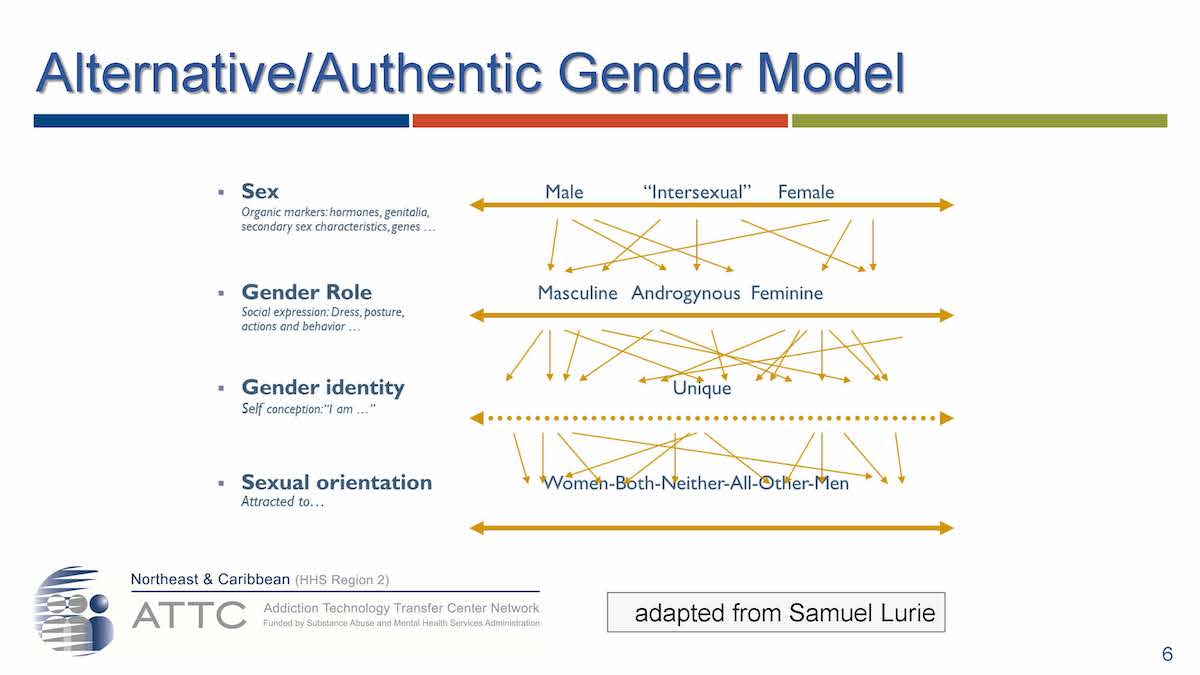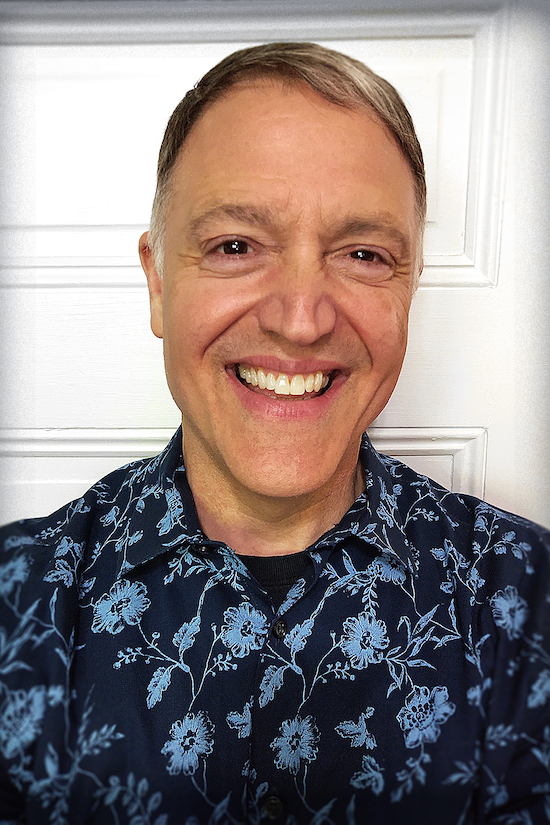By Paul Warren, LMSW, Research Project Director at the New York State Psychiatric Institute

Fear of “saying the wrong thing,” of “offending,” because providers don’t know the right word(s) to say, is a consistent theme that emerges during every LGBTQIA-focused training I’ve ever facilitated.
So too is the related expectation that a single training will supply the Lavender Lingo Lexicon (nonexistent-to my knowledge), and having memorized that, all will be peace under the rainbow sticker displayed in the waiting area. The End.
Alas, if knowing the right words were magic, and it was that easy!
While knowing respectful words to use with and ways to address LGBTQIA people are certainly important for providers in establishing rapport and building trust, they by no means guarantee engagement or retention. That’s why the training we’re providing at Northeast & Caribbean ATTC is called “Serving LGBTQIA People - More Than Knowing the Current Lingo.”
The LGBTQIA acronym itself is complex. It can be fraught, because of the associations it imposes. It’s also consistently inadequate in its capacity to meaningfully represent those claiming or rejecting a place under the ever-widening umbrella.
Knowing the acronym, and the definition thereof, may also create an illusory sense of confidence in providers who serve people who are represented by the letters and numbers presently appearing in the acronym.
“I know the B stands for bisexual; once I know the right words to say to bisexuals, I’m good to go with all bisexuals,” may be the well-intentioned but ill-informed thought for some.
Our learning community conversation is part of a journey toward the aspirational goal of cultural competence. A goal we can choose to walk toward and a goal that we cannot achieve with anyone other than ourselves.
This training proposes several specific points of consideration as the rationale for engaging in this conversation. Individually and as a group, LGBTQIA people are nearly four times more likely to be victims of violent crime (Flores, Langton, Meyer, & Romero, 2020). That same study found they’re also more likely to experience violence both by someone they know well and by strangers.
Historical trauma, the experience of complex trauma, and chronic stress have led to the manifestation of evident and specific health disparities within these communities, according to a 2020 report on Lesbian, Gay, Bisexual and Transgender health from the U.S. Department of Health’s Office of Disease Prevention and Health Promotion.
Additionally, some LGBTQIA people do not seek or delay getting care. Past negative experiences, fears of disrespect and care being denied remain significant barriers (Dean, Victor, & Guidry-Grimes, 2018).
Some providers avoid asking questions about important relationships and sexual behaviors – sending a clear message of, “I didn’t ask, so don’t tell.”
If a patient, any patient, does not feel safe, respected or welcome, there is the strong possibility that vital information, necessary for effective treatment choices and the provision of care, will be dangerously absent.
Having unconscious biases and blind spots is a normal part of being human. It’s a kind of programing that can be explored, managed, and kept from negatively impacting engagement and collaboration. It’s important for everyone to understand that we are not bad people because we have unconscious biases and blind spots. Individuals can choose to be a service provider who takes responsibility and offers every person they serve, safety, respect, and welcome.
Other major concepts this training seeks to convey include:
If we are authentically seeking to understand, if we acknowledge that the person across from us is the expert, and if we are open to the process of lifelong learning, we can come back from a mistake. Mistakes can provide an opportunity to deepen engagement with the person we are providing services to, for us, and support the process of Cultural Humility.
Cultural Humility is both a philosophy and a process which can lead to retention and more specific and effective care. Contact with people that providers may not have things in common with or those they believe or assume they do, can be employed as unique opportunities to learn, reflect, and grow, professionally and personally.
We also acknowledge and consider the interplay of power and privilege in all our interactions. Turning this philosophy into practice requires us to be ever cognizant that we are not better than the people we serve and that they teach us about their lives.
The practice of Cultural Humility requires openness, self-critique, the sharing of power and intentional actions. Participants are invited to reflect on their experience and to consider that their participation during the event is an action with the potential to offer safety, respect, welcome and support for the achievement of the health and life goals of LGBTQIA people.
To find out more about what the NeC-ATTC has to offer, and participate in this LGBTQIA-specific learning community conversation, please visit our website.
References
1. Flores, A. R., Langton, L., Meyer, I. H., & Romero, A. P. (2020). Victimization rates and traits of sexual and gender minorities in the United States: Results from the National Crime Victimization Survey, 2017. Science Advances, 6(40). https://doi.org/10.1126/sciadv.aba6910
2. Lesbian, gay, bisexual, and Transgender Health. Lesbian, Gay, Bisexual, and Transgender Health | Healthy People 2020. (n.d.). Retrieved May 10, 2022, from https://www.healthypeople.gov/2020/topics-objectives/topic/lesbian-gay-bisexual-and-transgender-health
3. Dean, M.A., Victor, E. & Guidry-Grimes, L. Erratum to: Inhospitable Healthcare Spaces: Why Diversity Training on LGBTQIA Issues Is Not Enough. Bioethical Inquiry 15, 173 (2018). https://doi.org/10.1007/s11673-016-9745-x
 About the Author: Paul Warren, LMSW, (he, him, his, they) - is a Research Project Director at the New York State Psychiatric Institute and a senior staff trainer and curriculum writer at the Northeast and Caribbean – Addiction Technology Transfer Center (NeC-ATTC). In 2017, he co-developed the New York City Department of Health and Mental Hygiene’s Training and Practice Implementation Institute, which supports the adoption and refinement of Motivational Interviewing within the Substance Use Disorder workforce. Paul began his career providing direct services to people living with HIV/AIDS from 1991 to 2003. He is a graduate of Hunter College School of Social Work where he specialized in Group Work.
About the Author: Paul Warren, LMSW, (he, him, his, they) - is a Research Project Director at the New York State Psychiatric Institute and a senior staff trainer and curriculum writer at the Northeast and Caribbean – Addiction Technology Transfer Center (NeC-ATTC). In 2017, he co-developed the New York City Department of Health and Mental Hygiene’s Training and Practice Implementation Institute, which supports the adoption and refinement of Motivational Interviewing within the Substance Use Disorder workforce. Paul began his career providing direct services to people living with HIV/AIDS from 1991 to 2003. He is a graduate of Hunter College School of Social Work where he specialized in Group Work.